26 May2022
By James Carskadon
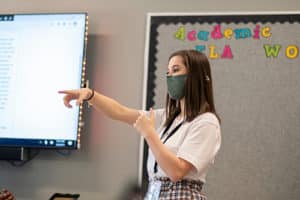
(photo by Megan Bean / © Mississippi State University) Partnership Middle School English class – MSU secondary education major Lauren Threadgill works with a class of seventh grade students as a student intern in the school.
A $2.4 million National Science Foundation grant supports a Mississippi State University-led project that aims better prepare educators for teaching in rural settings.
Mississippi State University is leading a nationwide project with the goal of better preparing educators for teaching in rural settings.
With $2.4 million in support from the National Science Foundation, the project entitled “Investigating STEM Teacher Preparation and Rural Teacher Persistence and Retention” brings together 14 universities to address workforce challenges in school settings, particularly for STEM teachers in rural areas. The project examines how educator preparation programs impact future STEM teachers’ intentions to teach in rural schools, as well as their retention rates at rural schools once they are in the workforce. Studies have shown that in addition to struggling to recruit teachers, rural schools have the highest rates of teacher attrition, with higher attrition rates occurring in the southern U.S. and in schools that serve low-income and minority students.
26 May2022
By Eric Gorton
26 May2022
By SFA News
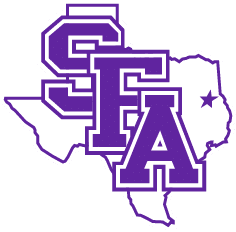 Stephen F. Austin State University’s James I. Perkins College of Education has partnered with the Nacogdoches Independent School District to staff up to eight paid internships during the 2022-23 academic year.
Stephen F. Austin State University’s James I. Perkins College of Education has partnered with the Nacogdoches Independent School District to staff up to eight paid internships during the 2022-23 academic year.
The program, which launches this fall, will let students use clinical teaching assignments to gain valuable classroom experience before entering the education workforce.
Implementation of the new program is meant to ensure that the educational field is keeping pace with others, said Gabriel Trujillo, NISD superintendent.
26 May2022
By Matthew Wales
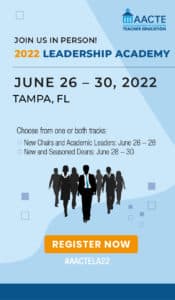 In this climate of ever-increasing polarization, where a recent study suggests that one third of the population cannot understand or empathize with differing points of view, the pressure on academic leaders to mitigate conflict is greater than ever. Add in the varying backgrounds of faculty and staff, as well as different work styles and remote environments, and you have the potential for a tense and anxious work environment. As a result, today’s academic leaders find themselves challenged to improve and advance their programs and institutions amidst an increasingly contentious climate.
In this climate of ever-increasing polarization, where a recent study suggests that one third of the population cannot understand or empathize with differing points of view, the pressure on academic leaders to mitigate conflict is greater than ever. Add in the varying backgrounds of faculty and staff, as well as different work styles and remote environments, and you have the potential for a tense and anxious work environment. As a result, today’s academic leaders find themselves challenged to improve and advance their programs and institutions amidst an increasingly contentious climate.
At the same time, academic leaders find themselves navigating the media spotlight thrust upon their programs due to the politicization of education. Whether it’s national reporting, local coverage, or the various social media platforms, a picture of education and teacher preparation is being painted, with or without the perspective and insight of our educator preparation programs.
24 May2022
By Carlin Dougherty
This article originally appeared on the Louisiana State University website and reprinted with permission.
Kala Burrell-Craft, 2022 AACTE Best Practice Award in Support of Multicultural Education and Diversity Recipient, answers 5 questions about her time at Louisiana State University and her career journey.
Tell us a little bit about yourself, your LSU journey, and what you’re up to now.
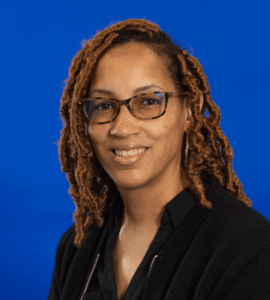 My name is Kala Burrell-Craft and I am from Oak Grove, Louisiana, which is in West Carroll Parish in the northern part of the state. I started my LSU journey in 2015 when I was hired by Dr. R. Kenton Denny to work with his team on the federal funded Louisiana State Personnel Development Grant. I applied later that year for the PhD program in Educational Leadership and Research and started that very interesting yet fulfilling journey. I earned the following degrees/certificates while at LSU: Post graduate certificate – Urban and Community Education (2019), PhD in Educational Leadership and Research with a focus on Higher Education Administration (2018), and Educational Specialist – Educational Leadership (2017).
My name is Kala Burrell-Craft and I am from Oak Grove, Louisiana, which is in West Carroll Parish in the northern part of the state. I started my LSU journey in 2015 when I was hired by Dr. R. Kenton Denny to work with his team on the federal funded Louisiana State Personnel Development Grant. I applied later that year for the PhD program in Educational Leadership and Research and started that very interesting yet fulfilling journey. I earned the following degrees/certificates while at LSU: Post graduate certificate – Urban and Community Education (2019), PhD in Educational Leadership and Research with a focus on Higher Education Administration (2018), and Educational Specialist – Educational Leadership (2017).
24 May2022
By Nicole Dunn

In the final installment of the Asian American, Native Hawaiian, and Pacific Islander (AANHPI) Heritage Month blog series, AACTE and Valerie Ooka Pang spoke with Lin Wu, recipient of the 2022 AACTE Outstanding Dissertation Award for “Borderland Teaching of Chinese American Teachers with Mexican American Students: Toward the Development of a Theory,” about his research, experiences in the academy, and insights on the triumphs and challenges of AANHPI educators and students.
Wu, who completed his dissertation for the Ph.D. at the University of Washington-Seattle and currently serves as an assistant professor in the College of Education at Western Oregon University, is the first Asian male to receive the distinguished award. When he began his graduate scholarship in the Deep South, where there is a Black-White racial binary, he says, “I just always felt like I did not belong to either group. I am somewhere in between.” This led Wu to his dissertation research and he asked himself, “What if I’m not alone? What if other Asian American teachers, specifically Chinese American teachers, share a similar experience?”
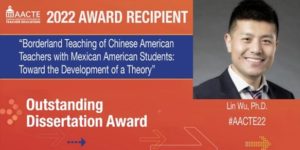 Wu’s dissertation studied three Chinese American teachers working with 11 Mexican American students in three ethnically diverse urban secondary schools in the Pacific Northwest, a unprolific research topic in the field. “As I was doing a literature review for my dissertation, [most of the research] was on teachers of color working with students of color from the same ethnic or racial group. I don’t know if it is intentional, but I ask myself [why is it] few folks want to discuss crossing ‘minority’ cultural borders in our research?” He reminds scholars of a quote from Toni Morrison that motivated him through this challenge, “If there’s a book that you want to read, but it hasn’t been written yet, then you must write it.”
Wu’s dissertation studied three Chinese American teachers working with 11 Mexican American students in three ethnically diverse urban secondary schools in the Pacific Northwest, a unprolific research topic in the field. “As I was doing a literature review for my dissertation, [most of the research] was on teachers of color working with students of color from the same ethnic or racial group. I don’t know if it is intentional, but I ask myself [why is it] few folks want to discuss crossing ‘minority’ cultural borders in our research?” He reminds scholars of a quote from Toni Morrison that motivated him through this challenge, “If there’s a book that you want to read, but it hasn’t been written yet, then you must write it.”
In his acceptance speech at AACTE’s 2022 Annual Meeting, Wu reminded the audience of the anniversary of the deadly shooting in Atlanta that killed eight people, six of whom were working-class Asian women. We join Wu in asking members to remember their lives and say their names: Hyun Jung Grant, Soon Chung Park, Suncha Kim, Yong Ae Yue, Xiaojie Tan and Daoyou Feng.
To create a more just society for AANHPI communities, all teachers must represent and validate the prolific histories and multi-dimensional identities of AANHPI students. This need was encapsulated perfectly in advice Wu received from Gloria Ladson-Billings about his job as a teacher educator, “It is not about you.” He elaborates, “[she said] I am not invalidating your struggles. Your struggles are real …. However, when your daughter goes to school, she will have to learn to navigate this world in a way that does not see her fully. So, your job is to make sure that the teachers and adults who will work with her one day will not do that.” We agree that all teacher education faculty share responsibility to ensure all preservice teachers are prepared to see students for who they fully are.
Wu’s Doctoral Experience
In addition to improving AANHPI inclusive curriculum and pedagogical standards, we know that representation matters. There is a lack of male teachers of color in the United States, AANHPI included. Wu reflected on his experiences as a doctoral student and recommended that programs be more intentional in providing financial support to Asians and Asian Americans, a barrier he faced in funding his education partially due to the model minority belief. This and other themes raised in Wu’s experiences resemble barriers to becoming a teacher found in AACTE’s Black and Hispanic/Latino Male Teacher NIC, including feelings of isolation, lacking familial and academic resources as a first-generation college student, family caretaker expectations, needing to work to support oneself while studying, and racial and gender stereotypes.
Wu explains that the male teacher of Color shortage is even worse in teacher education. When he began working as a graduate teaching assistant, he was the only male doctoral student of color for two years in that teacher education program. Beyond the socio-cultural barriers, Wu recalls a lack of curricular representation in many graduate courses, either for or by AANHPI scholars. When describing the research used across most of his methods training classes as a doctoral candidate, he says, “If I remember correctly, there were only two articles written by Asian American scholars, neither of which focused on Asian American students or teachers.” To be more inclusive, EPPs must ensure their curriculum represents every group so that students interested in research in those directions have access to representative resources. Finally, Wu describes the role mentorship played in his success: “I am eternally grateful to the sustaining mentorship from eminent scholars, including Dr. Geneva Gay and Dr. Valerie Ooka Pang. Cross-cultural and cross-gender mentorship is crucial for me because I will need mentors with different backgrounds and expertise to guide my work to represent my community better.”
Wu’s Teaching Experience
Now, as a faculty member teaching Social Cultural Foundations of Education and Multicultural Education, Wu works with predominantly White female preservice teachers. Besides preparing them to become culturally responsive teachers, he hopes to (re)present Asian men positively since most of them never had the opportunity to learn from Asian male teachers. That is another challenge facing all leaders in spaces where they are underrepresented — the expectation to “do everything right because you want to be a good representation of your community.” Wu continues, “My first time teaching the multicultural education course was challenging because some students did not perceive an Asian man to be qualified to talk about race.” His response is advice all educators should take since no one can be responsible for explaining or representing any group perfectly: “How do I humanize and correct the mistakes I made and teach my students to do the same?” What is even more essential within Wu’s advice is to do so with humility.
Earlier this year, in AACTE focus groups on teaching the truth in history and civics, teacher education faculty consistently agreed that end-of-course student evaluations created hesitation around discussing race and racism in the classroom, even when they desired to do so. Normalizing these open discussions and providing students with tools to analyze and counter accusations about critical race theory and other frameworks for democratic discussions on race and racism is essential. AACTE is grateful to Wu for modeling its efficacy, “I am committed to helping teachers transform their struggles into agencies to support all students, especially students of color.”
Wu’s Recommendations
Lastly, Wu shares some recommendations to support AANHPI faculty and be more inclusive of AANHPI students and other students of color in schools. First, he says faculty should be prepared to have effective and frequent discussions on diversity, equity, and inclusion, by asking “How is the end-of-year feedback going to improve my teaching or your learning? My job is not to nag you about how racism impacts everybody in society. My job is to prepare you for the work you need to do so that you can succeed and sustain your success in this profession.” To accomplish this, faculty should remain committed learners by reading classic and emerging research and scholarship on advancing racial equity. Wu says, “I always strive to pair classic readings such as culturally responsive teaching with emerging case studies on [what] it looks like in practice for ethnically diverse students across content areas and grade levels.”
When it comes to program structures, Wu recommends EPPs make social-cultural foundation and multicultural education courses a requirement for all teacher candidates. Hire qualified faculty members, especially those of color, to teach the courses, provide systemic support, and ensure that the course content is historically grounded, theoretically rich, practically nuanced, and represents every racial group.
Finally, teacher education programs must allocate sustaining support for AANHPI faculty to pursue their research and develop their leadership capacity. “I am grateful to my mentor, Dr. Ken Carano, for helping me navigate my journey as a tenure-track faculty at Western Oregon University. I also appreciate my dean, Dr. Mark Girod, for funding my research and supporting me to lead the annual AAPI Heritage Month celebration in our college,” says Wu.
Wu wants Asian American scholars and other scholars of color in teacher education to know they should find colleagues and mentors who can support their personal and professional growth within and outside their institutions. Even though every institution has its problems, scholars of color can build a supportive network that nurtures their souls and helps them thrive.
The biggest takeaway in our interview with Wu is this: Teachers must understand that this job is never about them. Wu adds, “Your job is to teach students to be critical thinkers, engaged citizens, and supportive community members, who can challenge things when they are not right.”
Read other blogs in the AANHPI Heritage Month Series:
24 May2022
By Kaitlyn Brennan

See you on Twitter @brennan_kait!
Do you have a question about Washington Update? Want more information? Email me, and let’s have a virtual coffee break: kaitlynbrennan88@gmail.com.
24 May2022
By Brooke Evans
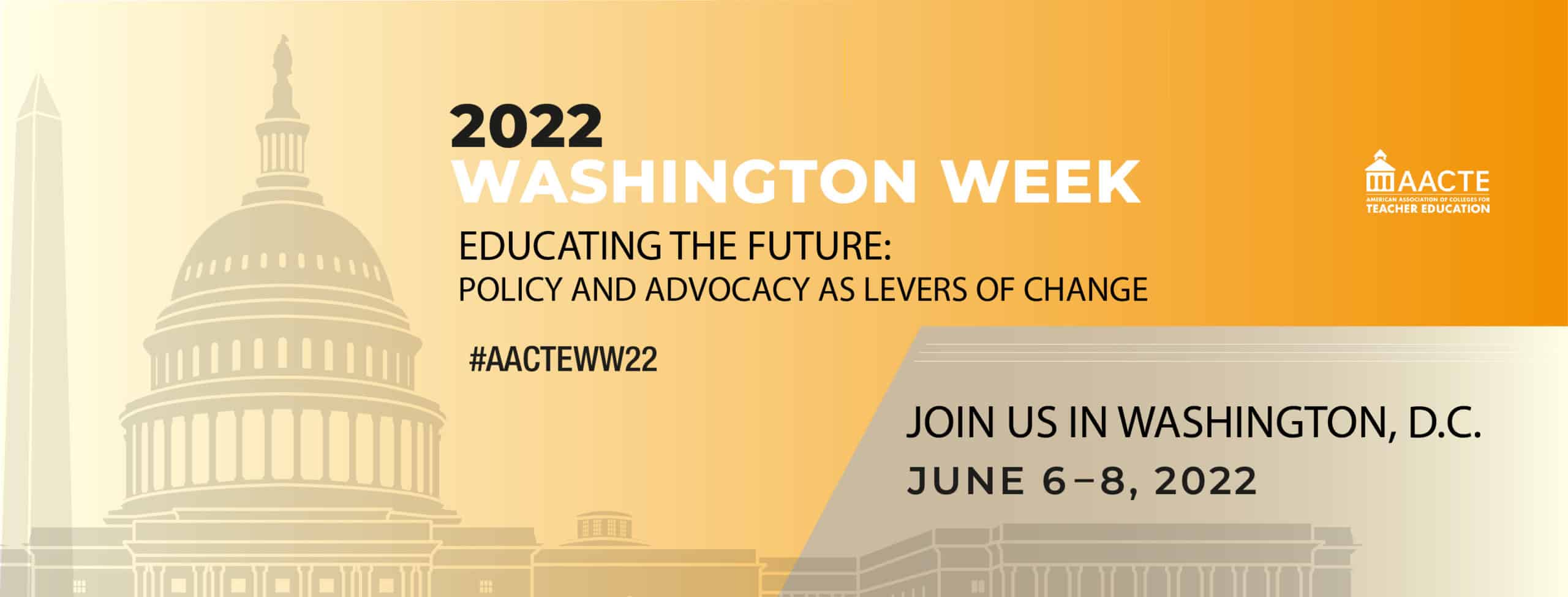
For the first time in three years, AACTE will be hosting its 2022 Washington Week in-person in Washington DC, June 6 – 8. This annual educational policy and advocacy event draws together AACTE’s State Chapter Leadership, Holmes’ Scholars, deans, and faculty for an opportunity to learn and advocate for education and high quality educational preparation programs throughout the country.
This year, AACTE is combining the best programming from three separate events — State Leaders Institute, Holmes Policy Institute, and Day on the Hill — into one reimagined mini-conference for enhanced collaboration and networking. The 2022 Washington Week program includes shared keynotes and strand-based sessions on today’s most critical issues in education and teacher preparation: censorship, educator shortage, and educator diversity. Attendees can choose to align with a particular strand throughout the event or select sessions from among the three strands.
Holmes Scholar and Ph.D. student from Ohio University, Shauna Torrington attends Washington Week because she loves how the training has helped her to find her voice, “I have been better able to articulate my views to support my stance on any subject.” Torrington shares the rest of her thoughts about Washington Week with AACTE.
19 May2022
By Abbey Goers
As program director for early childhood education in the School of Education, Barnhart received several inquiries from working adults who were hoping for an online degree option.
“Our traditional face-to-face, four-year program didn’t meet the needs of these individuals,” she said. “UW-Stout’s new online early childhood education degree was created specifically for working adults with an associate degree, coursework completed at another institution, a degree in another field or currently licensed teachers in another area.”
The program was approved by the Provost’s Office on March 4. Applications are open, and classes begin this fall semester.
19 May2022
By Brooke Evans
 PNC Bank, N.A. has awarded AACTE with a charitable sponsorship to support the Holmes Program with the goal of helping to diversify the nation’s education workforce. This program provides mentorship, professional development and support to students who self-identify as racially and ethnically diverse and are pursuing graduate degrees in education at AACTE member institutions. More specifically, the PNC funding will support the Holmes Scholars’ Research and Dissertation Retreat, and the Career Expo.
PNC Bank, N.A. has awarded AACTE with a charitable sponsorship to support the Holmes Program with the goal of helping to diversify the nation’s education workforce. This program provides mentorship, professional development and support to students who self-identify as racially and ethnically diverse and are pursuing graduate degrees in education at AACTE member institutions. More specifically, the PNC funding will support the Holmes Scholars’ Research and Dissertation Retreat, and the Career Expo.
The Research and Dissertation Retreat brings together Holmes Scholars for an intensive, in-person professional development opportunity focused on research methods, academic writing, and scholarship while the Career Expo will connect these Holmes Scholars with AACTE member institutions to learn about opportunities and the faculty job search process. Scholars will have an opportunity to meet with faculty and search committee representatives face-to-face. Both the Retreat and Expo offer our diverse Holmes Scholars with unprecedented academic and career development.
18 May2022
By Matthew Wales
 Earlier last month, AACTE announced that its signature, Leadership Academy convening would be returning in 2022 with a new, in-person format. The reimagined programming allows academic leaders to customize their learning experience while minimizing time spent out of the office. And at a reduced price point, attendees can participate in essential professional development while saving money on registration and hotel costs.
Earlier last month, AACTE announced that its signature, Leadership Academy convening would be returning in 2022 with a new, in-person format. The reimagined programming allows academic leaders to customize their learning experience while minimizing time spent out of the office. And at a reduced price point, attendees can participate in essential professional development while saving money on registration and hotel costs.
But why should new and seasoned leaders attend the Academy? Here’s what a few of this year’s confirmed registrants had to say regarding their decision to attend in 2022, and what they hope to gain from the experience:
17 May2022
By Meghan Grenda
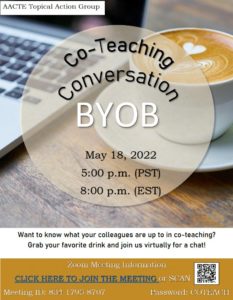 The Co-Teaching in Clinical Practice Topical Action Group (TAG) is hosting their end of year virtual chat for all AACTE members and you are invited to join.
The Co-Teaching in Clinical Practice Topical Action Group (TAG) is hosting their end of year virtual chat for all AACTE members and you are invited to join.
What: Co-Teaching in Clinical Practice Topical Action Group
When: Wednesday, May 18
Time: 8:00 p.m. EST / 5:00 p.m. PST
Registration Information:
- Meeting ID: 834 1795 8707
- Password: COTEACH
AACTE’s TAGs are action-oriented working groups that focus on areas such as accreditation, historically Black colleges and universities (HBCUs), elementary education, research in teacher preparation, international education, and women in leadership, just to name a few.
To view the full the list of the 20 TAGs visit: aacte.org and join the TAG community on aacteconnect360.org.
If you have any questions please reach out to me at mgrenda@aacte.org.
17 May2022
By Kaitlyn Brennan
This weekly Washington Update is intended to keep members informed on Capitol Hill activities impacting the educator preparation community. The views expressed in this post do not necessarily reflect the views of AACTE.
After 45 years, the Department of Education has announced plans to update Section 504 of the Rehabilitation Act of 1973. Stay tuned for opportunities to provide feedback to stakeholders on what you would like to see. Take a read for more information on that and more below.
Department of Education Announces Plan to Update Section 504 of the Rehabilitation Act of 1973
Last Friday, the U.S. Department of Education announced plans to update Section 504 of the Rehabilitation Act of 1973. The forthcoming changes will mark the first update to the regulations in 45 years. The Department’s Section 504 regulations were the first set of regulations issued by the federal government that addressed the treatment of people with disabilities through a civil rights framework, rather than through solely a medical or vocational framework. Section 504 prohibits discrimination on the basis of disability in public and private programs and activities that receive federal financial assistance, including schools and postsecondary institutions.
“While the world has undergone enormous changes since 1977, the Department’s Section 504 regulations have remained, with few exceptions, unaltered,” said Assistant Secretary for Civil Rights Catherine E. Lhamon. “As we observe the 45th anniversary of these important regulations this month, it is time to start the process of updating them. Just as in 1977, the voices of people with disabilities must be heard and incorporated as we engage in that work.”
17 May2022
By Nicole Dunn
As of May 2, PEN America has noted that 34% of Live Educational Gag Order bills affect Institutes of Higher Education, and 100% of the teachers in the 15 states that have signed gag orders into law feel the impact on their work. In addition to these laws and the more than 80 live gag-order bills, rampant illegal and legalized banning of books is restricting the rights of educators to serve diverse students and their equally diverse needs. It is necessary for educators to understand and address this coordinated attack to protect students’ quality of education, human rights and mental health.
This year, at AACTE’s 2022 Washington Week, AACTE has dedicated one of its three strands to education censorship. The strand was developed based on feedback from members and AACTE’s research report on education censorship. Highlights from the report will be released at Washington Week. Sessions will cover the following objectives:
- The scope, tactics, and themes within education censorship policies
- Which policies implicate IHE, and how faculty can organize to address them
- How these policies and the moral panic surrounding them affect the work of teachers, and therefore teacher educators
17 May2022
By Lisa Bisogno

Advocacy for teacher preparation programs and the fundamental need to place highly diverse qualified teachers in the classroom across the nation is more dire than ever before. AACTE’s Washington Week is the precise opportunity to perfect one’s craft of advocacy through training, workshops, and immersive experiences by conducting congressional visits with Senators and Congressmen or Congresswomen on Capitol Hill.
Legislators may not be aware of the obstacles our teacher preparation programs are confronted with on a daily basis nor the negative impact it is having on school districts in surrounding communities, and someone else might be telling your story incorrectly. This is one of the times when universities aren’t competing against one another and can come together to advocate the need for teacher preparation to be an equitable education for all children. Institutions of higher education are able to cohesively express the barriers encountered by teacher preparation programs and share their stories as one collective unit to their designated state legislators. You are able to learn how to advocate for the importance of the Higher Education Act, Teacher Quality Grants, and other fiscal appropriations that pertain to teacher preparation in the hopes that legislators will move it to the forefront of their agenda. More significantly, Washington Week has returned in person this year allowing you to better collaborate with colleagues in your field and even within your state.



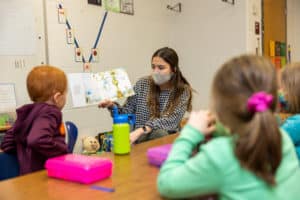







 PNC Bank, N.A. has awarded AACTE with a charitable sponsorship to support the Holmes Program with the goal of helping to diversify the nation’s education workforce. This program provides mentorship, professional development and support to students who self-identify as racially and ethnically diverse and are pursuing graduate degrees in education at AACTE member institutions. More specifically, the PNC funding will support the Holmes Scholars’ Research and Dissertation Retreat, and the Career Expo.
PNC Bank, N.A. has awarded AACTE with a charitable sponsorship to support the Holmes Program with the goal of helping to diversify the nation’s education workforce. This program provides mentorship, professional development and support to students who self-identify as racially and ethnically diverse and are pursuing graduate degrees in education at AACTE member institutions. More specifically, the PNC funding will support the Holmes Scholars’ Research and Dissertation Retreat, and the Career Expo.  The
The 